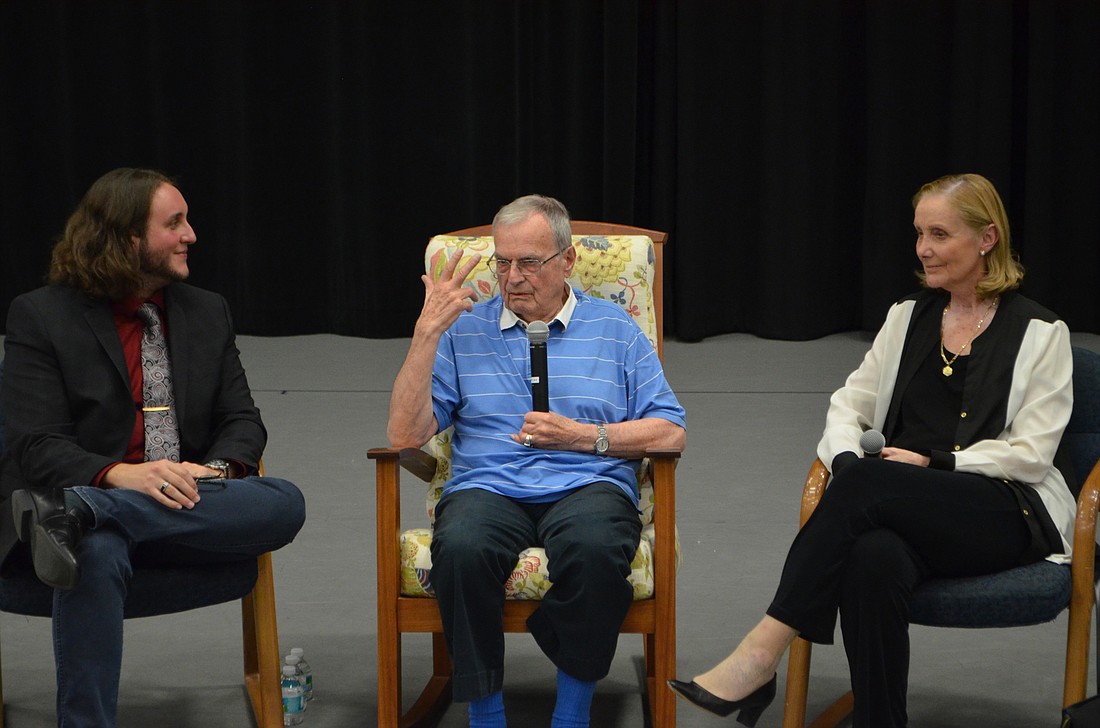- July 9, 2025
-
-
Loading

Loading

An hour wasn't nearly enough time to discuss a lifetime's worth of ballet stories, but Sir Peter Wright, one of the foremost living legends of 20th century British ballet, told a rapt audience inside Studio One at the FSU Performing Arts Center a condensed version of his journey in the world of dance. And it's been quite the journey. Dancing since he took a ballet class with his two sisters when he was just seven-years-old in 1933, Wright spent the next 70 years dancing, teaching, creating choreography and leading some of Europe's premiere dance companies.
"When I was seven, my mom took me to a dancing class with my two sisters," says Wright. "They hated it. I loved it. I suddenly got this passion to dance. I had never even seen a ballet but I knew I had to just dance."
That passion was still evident in 88-year-old Wright as he began from those humble beginnings as a boy bent on dancing and moving and went through his whole career to a studio filled with dance fans and ballet dancers themselves. In town to see the Sarasota Ballet's second program of its 25th anniversary, which features the American premiere of Wright's piece "Summertide," the ballet hosted this last-minute talk after the staff heard some of the incredible stories Wright shared with the students in the ballet's Margaret Barbieri Conservatory.
"It was fantastic to hear these amazing stories from an icon who can explain firsthand how ballet grew and evolved," says Jason Webb, graphic designer and marketing associate of the Sarasota Ballet, "These stories really made the art form tangible to our conservatory students and I thought that more people had to hear those same stories while he was still in Sarasota."
Though the lecture event had only been announced just a few days before, nearly every seat in the ballet studio was full. He began with that fateful class with his sisters and shared the highlights of the next several decades.
Shortly after that inaugural dance class, his Quaker father forbid him from pursuing dance as a career. Wright satiated his unbridled need to move by being captain on both his school's tennis and swim teams. However, he needed more. He needed to dance. So at 17, Wright ran away from home and his boarding school Bedales with a female classmate. After Wright and his classmate turned themselves into the authorities, his father finally acquiesced and gave his son his blessing to dance. However, he'd have to pay for it himself.
It was then and there at the height of World War II that Wright began his climb up the ranks of the British Ballet community. He started by apprenticing at the influential modern company the Ballets Jooss. Wright then discussed performing in musicals like "Finian's Rainbow" and "Flower Drum Song" to pay for his ballet classes before being taken under the wing of influential teachers and dancers Ninette de Valois and Vera Volkova, John Cranko and Sir Kenneth MacMillan. Under their tutelage and teamwork, Wright says that he was able to become a dancer, ballet master, director and choreographer at the Sadler's Wells Theatre Ballet, the Stuttgart Ballet, The Royal Ballet, the Sadler's Wells Royal Ballet and eventually moving that company as its artistic director to Birmingham in 1990.
And even after a life filled with dance, Wright still remembers the power of his first ballet as a child: The International Ballet company. "I was absolutely enthralled the second that curtain went up," says Wright. "There were a lot of women onstage, but I looked in the back and saw male ballet dancer. After their performance I said, 'That's it. This is for me.'"